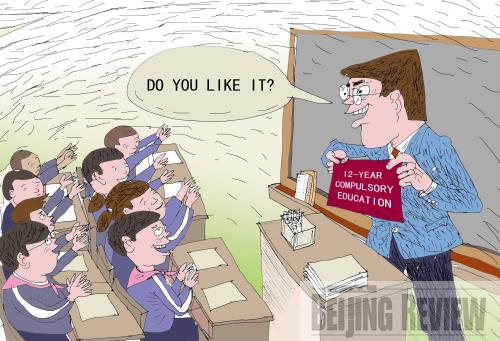|
 |
|
LI SHIGONG |
China's pending education reform program is very likely to propose an extension of the compulsory education period to include senior middle school education. That's according to Sun Yunxiao, Deputy Director of the China Youth and Children Research Center. However, it seems that the current nine-year compulsory education system will remain in force as the Ministry of Education believes that a 12-year scheme is beyond the country's fiscal capability.
The ministry has encouraged economically developed regions to introduce the 12-year compulsory education scheme, but ruled it out as a national option. Compulsory education means free education, but the country is not able to finance such a huge project yet, said ministry officials.
While there are those who agree with the Ministry of Education, most people feel dissatisfied.
Generally speaking, the length of compulsory education depends on the government's fiscal revenue and policy orientation. Those in favor of an extension say that there are many countries whose fiscal and overall national conditions are worse than China's, yet they have long been offering free 12-year compulsory education. Why should China still lag behind?
China's education input now accounts for less than 4 percent of its gross domestic product (GDP). Although providing 12-year compulsory education is not an easy job, the government should at least set a long-term objective to show its strong determination in improving the country's education system, say supporters.
Equal education
Zhang Dongyang (www.china.com.cn): The Chinese Government intended to raise the proportion of education input to national GDP to 4 percent at the end of the 20th century. It is still, however, less than 4 percent.
The state makes big investment in industry and agriculture, as these sectors bring quick returns. If the same input is made into education, the return is almost unforeseeable, taking three or five years following the investment.
At present, of the world's 190 countries, more than 170 offer free compulsory education. Most developed countries have 12-year compulsory education and are advancing toward a 15-year scheme. Even in underdeveloped countries, 12-year compulsory education is becoming the norm.
However, China, a country that contributes 20 percent of the world's economic growth and whose economic aggregate ranks third in the world, is still frugal when it comes to spending on education. In 2006, it was calculated that if China began to adopt the 12-year compulsory education system then, the annual input needed would be 226 billion yuan ($32.3 billion), or nearly 6 percent of the Chinese Government's annual fiscal revenue of 4 trillion yuan ($570 billion). This is to say, money is not as big an obstacle to launch this plan as it is made out to be.
It is education that nurtures the human resources that are needed for economic and social development, pushes forward progresses in science and technology and improves our living quality. Free 12-year compulsory education will reduce and even remove education inequality and greatly improve the quality of children from underdeveloped rural areas and low-income urban families. The delay of 12-year education will force tens of thousands of middle school students to drop out every year. This is a terrible loss to an emerging economy like China.
Xiong Bingqi (China Business News): According to the National Bureau of Statistics, China's GDP reached 30 trillion yuan ($4.3 trillion) in 2008 and the latest statistic for fiscal input in education is 3.32 percent of GDP. Considering the fact that China has started to offer free nine-year compulsory education, the proportion of education-related expenditures to GDP is approaching the mandatory target of 4 percent. If the government limits investment to 4 percent of GDP, 12-year compulsory education will be a difficult task. If the proportion is further raised, say, to 5 percent, the 12-year plan is not impossible.
Some may argue that even if the education input is raised to 5 percent of GDP, with so many projects thirsty for money, 12-year compulsory education is still impossible. Here, we need the government to think about the core responsibility of education and how to channel private funds into higher education, so that the state may invest more in elementary and secondary education.
Whether the 12-year compulsory education scheme will work depends not on the country's fiscal power but the government's attention to education.
Tong Dahuan (Oriental Morning Post): As far as China's education and social security, such as housing and health care, are concerned, fund allocations are still low. If the government would like to adjust its current fiscal input proportion, 12-year compulsory education is possible. For example, government cars cost several times the total expenses of senior middle schools nationwide.
The government's monopoly in education prevents private funds from being included. As government focus is too much on higher education, 3 percent of GDP is far from able to support the successful operation of the country's whole education system, especially elementary education.
| 